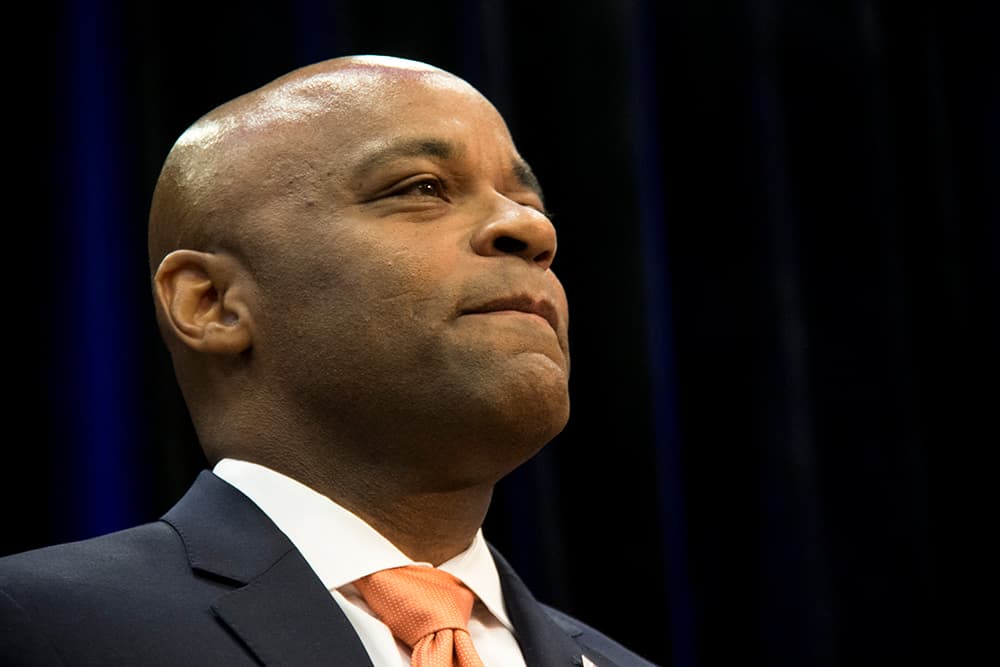The Denver City Council met for hours behind closed doors on Monday night before releasing its third major statement on the lascivious text messages that Mayor Michael Hancock sent to a city employee.
The elected officials now say that they are "unable" to investigate Hancock's behavior.
The statement, released by Council President Albus Brooks, says that all 13 council members agree that Hancock's conduct was unacceptable, but it cites several reasons that they can't do anything about it -- including the fact that there "are no disputed facts" and the council has only limited powers.
The council also called for new sexual harassment policies for Denver's elected officials.
The scandal flared up last month.
In March, Hancock admitted that he had sent suggestive messages in 2012 to Det. Leslie Branch-Wise, who was on his security staff.
At first, the council said that they weren't planning to use their investigative powers to look into the texts. They said that the detective hadn't requested an investigation, and so they didn't want to risk "re-victimizing her," they said in a statement.
Branch-Wise quickly requested the investigation. In response, the council asked its attorneys to "develop a proposal for a potential investigation," which they apparently discussed in closed sessions this week and last.
A city employee could have been disciplined or fired for Hancock's conduct. However, elected officials aren't subject to the city's workplace rules about harassment.
However, the council does have some oversight of the mayor.They have the legal power of subpoena, meaning they can call witnesses and request evidence -- but they don't have any formal power to suspend him or take other action, and they may not have subpoena power over the mayor himself.
The council also could hire an outside investigator.
After hours of discussion, the elected officials decided that they still couldn't move forward.
"Since we are not the judicial branch, we are unable to make a legal conclusion about the Mayor’s conduct and there are no disputed facts," he said.
He also noted that Branch-Wise had in 2013 waived "any opportunity to pursue the legal process where these types of legal conclusions are typically made." Branch-Wise accepted a $75,000 legal settlement in 2013. In that agreement, Branch-Wise released Denver and all its officials and employees from claims, demands and damages.
The mayor and the city council get legal advice from different people -- Hancock has city attorney Kristen Bronson, while the council relies on legal counsel Kirsten Crawford.
Council members said the system needs to change.
Brooks' statement said that the council would "adopt a clear policy and process for reporting and investigating complaints against a Council Member."
They asked Hancock to do the same for himself, adopting "consistent policies to meet the community’s demand for accountability."
In a statement, Hancock's office said that he has been "open, honest and transparent about this matter." He is "committed to learning and growing from all of this while continuing to lead the city forward," it continued.
Hancock has apologized to Branch-Wise. He denied that the messages constituted sexual harassment.
Here's Brooks' statement:
“Detective Leslie Branch-Wise requested the Denver City Council to publicly investigate whether Mayor Michael B. Hancock’s texts to her six years ago constituted sexual harassment. Each Council Member agrees that Mayor Hancock’s conduct was unacceptable. Tonight, based on extensive additional legal advice, Council is unable to grant Detective Branch-Wise’s request for an investigation. Since we are not the judicial branch, we are unable to make a legal conclusion about the Mayor’s conduct and there are no disputed facts. In 2013, Detective Branch-Wise waived any opportunity to pursue the legal process where these types of legal conclusions are typically made. Furthermore, the request for an open investigation would be problematic under state law confidentiality requirements.
Council is deeply concerned that there is not a process to make a complaint against a Denver elected official for sexual harassment. Council will lead by example and adopt a clear policy and process for reporting and investigating complaints against a Council Member. We call on the Mayor to follow suit and adopt consistent policies to meet the community’s demand for accountability.
Our attorney will communicate with Detective Branch-Wise’s attorney on this matter.”












